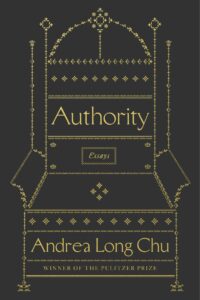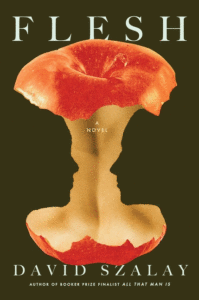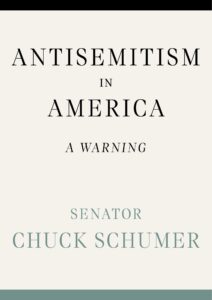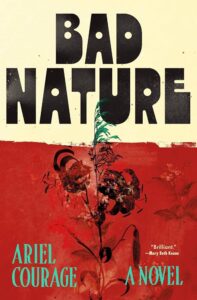Our barrel of brilliant reviews this week includes Becca Rothfeld on Andrea Long Chu’s Authority, Keiran Goddard on David Szalay’s Flesh, Cathleen Schine on Hanif Kureishi’s Shattered, David Klion on Chuck Schumer’s Antisemitism in America, and Alissa Nutting on Ariel Courage’s Bad Nature. Brought to you by Book Marks, Lit Hub’s home for book reviews. * “It is the fate of many writers to excel at what they most despise and fail at what they most acclaim. The critic Susan Sontag fancied herself a novelist despite the evident mediocrity of her stiffly experimental attempts; the German philosopher Martin Heidegger inflicted reams of maudlin poetry on a readership already dazed by the density of his demanding prose. And although she has spent years cultivating a single-minded emphasis on political virtue, the Pulitzer Prize-winning critic Andrea Long Chu is something of an aesthete. Admittedly, Chu’s true proclivities can be hard to discern at first glance. One might be forgiven for thinking that the provocative critic for New York magazine is not an aesthete or a political reformer but both, neither and everything in between. Her turbulent new essay collection, Authority, is not coherent, except insofar as any oeuvre acquires some measure of coherence by dint of its author’s recurrent preoccupations. … “If Chu had written nothing but ‘On Liking Women,’ she would have earned her reputation as one of the most dazzling writers of her generation. But for the past seven years she has been busy complicating this status by writing other essays, a few of them as virtuosic as her first, many of them significantly cruder. As a general rule, the pieces in Authority are better when they consider politics or gender directly, rather than using a novel as a thin pretext for the political discussion Chu obviously longs for.” –Becca Rothfeld on Andrea Long Chu’s Authority (The Washington Post) “Samuel Butler’s 1903 novel The Way of All Flesh carried with it an implied subtitle. In the book of Kings, from which Butler drew his title, the dying David tells his son Solomon, ‘take thou courage and shew thyself a man.’ Butler’s inference was clear enough: here is a book about what it means to live, what it means to die, and what might be a worthwhile way to fill the time in between. Flesh… has more than just a biblical allusion in common with Butler’s masterpiece. Thrillingly, in an age when we arguably have weaker stomachs for such things, it also shares its bold ontological and artistic ambitions. In Flesh, Szalay has written a novel about the Big Question: about the numbing strangeness of being alive; about what, if anything, it means to amble through time in a machine made of meat. … “Crucially, there is precisely nothing of the agentive, questing hero in István’s journey. Szalay has rendered a man buffeted by forces beyond his control, be they the erotic or material desires of those who surround him, the undulations of the global economy or the interventionist and racialised foreign policy of the European Union. A consistently phlegmatic and passive participant in the events of his life and the events of the wider world, István has something of the existential wayfarer about him—Camus’s Meursault meets Forrest Gump. … “There will be a temptation to pigeonhole Flesh as a novel about masculinity; its silences and its contortions, its frustrations and its codes. But while that is clearly a central concern, Szalay is also grappling with broader, knottier, more metaphysical issues. Because, at its heart, Flesh is about more than just the things that go unsaid: it is also about what is fundamentally unsayable, the ineffable things that sit at the centre of every life, hovering beyond the reach of language.” –Keiran Goddard on David Szalay’s Flesh (The Guardian) “There is no publishing category of after-the-medical-tragedy that I am aware of. Jean-Dominique Bauby’s The Diving Bell and the Butterfly (1997), which Bauby composed by blinking one eyelid, the only movement available to him after a stroke; Tony Judt’s The Memory Chalet (2010), dictated as he lay dying from ALS; Lucy Grealy’s Autobiography of a Face (1994), written after she was disfigured by cancer as a child—these are all books about medical catastrophes, but unlike articles in medical journals, each is the creation of a writer with a style and an imagination and a sense of humor and tragedy all their own. Shattered is in the tradition of these memoirs. But even more, it is in the tradition of its author. Kureishi’s style, his obsessions, his language—they’re all here in this extraordinary work. One of its powers is the inevitable, undeniable forward movement of time—marked in the Substack series by the regular arrival of an e-mail titled ‘Dispatches from my hospital bed,’ and marked in the book by the date at the end of each installment. The truth of immobility is checked off on the calendar. The days, weeks, months progress. But the rhythm of Kureishi’s body is not defined by the days or weeks or even hours. This narrative, though it has a beginning, has no end. … “A hospital is the place from which modesty and dignity disappear, desert you, seemingly forever, as soon as you cross the threshold. Kureishi, a reliably sexy, unrestricted writer, presents the physical deterioration and indignities he undergoes with his usual wit. The sense of vulnerability is crushing, but it is also one of the characteristics Kureishi reveals about himself that makes him so likable here, and the writing so intimate. The tone is remarkable: even the self-pity has no self-pity.” –Cathleen Schine on Hanif Kureishi’s Shattered (The New York Review of Books) “Barely two weeks into his second presidency, Donald Trump mused that he would like to see the entire Palestinian population of the Gaza Strip relocated to other countries, possibly never to return. ‘Why would they want to return? The place has been hell,’ he said, eliding that the reason Gaza has been hell is that Israel, with the help of generous military aid from both the Biden and Trump administrations, has carried out a merciless bombing campaign against a trapped civilian population without parallel this century. Human rights groups pointed out that what Trump was calling for would be straightforward ethnic cleansing, but that didn’t seem to bother the population of Israel—a survey taken shortly after the remarks indicated that roughly eight out of ten Israeli Jews supported Trump’s proposal at least in theory, while a mere 3 percent objected to it on moral grounds. Even before Trump floated the idea, Israel’s campaign in Gaza since the October 7, 2023, Hamas attacks had been called at least potentially genocidal by Human Rights Watch, Amnesty International, the International Court of Justice, and numerous leading scholars of genocide. But Chuck Schumer knows better. The Senate minority leader and New York Democrat is, as he boasts frequently in his new book Antisemitism in America: A Warning, the highest-ranking Jewish elected official in American history, and right now, in the midst of a world-historical atrocity being carried out by the U.S. and Israeli governments, he has more pressing concerns. He is certainly familiar with the charge—as he notes, protesters frequently gather outside his Park Slope apartment building to chant ‘Schumer, Schumer, you can’t hide, you’re supporting genocide’—but he dismisses it as a blood libel. … “Palestinians in general receive vanishingly little attention in Antisemitism in America. Schumer assures us that their suffering does trouble him but is always quick to blame Hamas for using innocent people as human shields, a cliche I’ve been hearing since I was a kid and one that conveniently absolves Israel of all responsibility for civilian casualties. Schumer…did plenty of research for this book, and is obviously not a stupid person; willful ignorance is the only explanation for why he seems to have read no Palestinian history, talked to no Palestinian activists or intellectuals, and seen no need to treat Palestinian lives as even comparably important to the emotional wellbeing of American Jews in the face of impolite rhetoric and vandalism.” –David Klion on Chuck Schumer’s Antisemitism in America: A Warning (The Baffler) “Personal-crisis travel narratives by white women, both memoirs and fiction, tend to follow certain conventions: protagonists embarking on journeys of earnest, emotional introspection in response to devastating news. These women tend not to be jerks. Hester—a lawyer who spends her days negotiating settlements for her conglomerate employer’s E.P.A. violations—runs right over these expectations with her Jaguar E-Type, then throws the car in reverse to do it again. Putting an unlikable heroine in the (literal) driver’s seat of a debut is an admirable feat, and Courage pulls it off through her character’s ruthless self-awareness, acerbic humor and one-liners so hilarious it’s tempting to read them aloud. … “It is easy, living in America, to be poisoned—physically and ethically. To suffer abuse, and then to perpetuate the cycle of harm. To chase wealth with little regard for the cost. But Bad Nature shows we’re getting selfishness all wrong. As uproariously funny as a takedown of our deadly society can be, the novel is also an urgent call to exchange possession for belonging. Hester is proof that, eventually, capitalism destroys even those it seems to benefit most.” –Alissa Nutting on Ariel Courage’s Bad Nature (The New York Times Book Review)




 By Literary Hub | Created at 2025-04-03 14:33:56 | Updated at 2025-04-04 23:36:39
1 day ago
By Literary Hub | Created at 2025-04-03 14:33:56 | Updated at 2025-04-04 23:36:39
1 day ago










